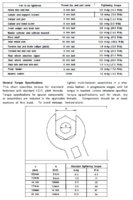Being european, we mostly use Nm, earlier it was Kgm (kilogram meter).
So when two of my friends were working on the automatic transmission on an old Dodge station wagon, the manual stated some torque values in "lbsin" (inch pounds), they scratched their heads, and looked at the torque wrench they had at hand. It actually had three scales, Nm, Kgm and "lbsft" (foot pounds). They then agreed that "lbsin" and "lbsft" must be more or less the same thing, and then proceeded to break ALL fasteners they intended to tighten.......The end result was buying a used transmission instead!
On a more serious note, I definitely would recommend abandoning inches, feet and pounds altogether, and get on with the common SI standard for torque, Nm (Newtonmeters), which is what everybody else is using these days. Also, I recommen using the smallest practicable torque wrench, as it will be more precise when applying torque to small fasteners, like M5 or M6. I have two inexpensive ($60-70 each) "Teng Tools" 3/8" torque wrenches myself, one 5-25 Nm (Which basically covers M5 to M8 fasteners) and one 20-110 Nm, which is just enough for wheel axle nuts on most bikes. 3/8" is definitely the best size for socket sets and acessories when working on motorcycles, imo.


